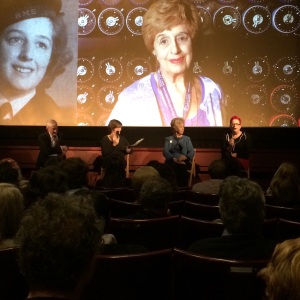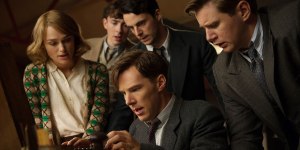Having spearheaded the most recent campaign to save Bletchley Park and being part of the campaign to get Alan Turing on a banknote I was very apprehensive about seeing the new film “The Imitation Game” starring Benedict Cumberbatch and Keira Knightley. The Imitation Game is based on Andrew Hodges biography of Alan Turing and his codebreaking work at Bletchley Park during WW2.
I spent several years of my life trying to raise public awareness of Bletchley Park and the contribution of the more than ten thousand people who worked there and have learnt a lot along the way. I’ve had conversations with several people who knew Turing, including his nephew and nieces and have spoken to many Bletchley Park veterans over the years.
I was apprehensive about seeing the film because I really didn’t want to see a film like “Enigma” again, a film which I’ve never actually managed to stay awake through despite being intensely interested in its subject matter. Apart from the fact that “Enigma” is not a particularly engaging film, I also found it preposterous that the character who is quite obviously supposed to be Turing is heterosexual in the film.
I was delighted to be invited to sit on a Q+A panel after the showing of “The Imitation Game” at the Phoenix Cinema in Finchley, North London. I was even more delighted when I found out that the other members of the panel were Bletchley Park veteran and Bombe operator Ruth Bourne and Bletchley Park experts John Gallehawk and John Alexander who had brought along his three Enigma machines. What a treat 🙂
It was my first trip to the Phoenix Cinema, the oldest purpose built cinema in London. I will definitely be going back, what a lovely place. Adam Gee who I think I met on Twitter in around 2009 when I started using it to raise the game in the save Bletchley Park campaign is a trustee of the Phoenix and asked me to be part of the panel. It was great to meet up with him again after not seeing each other in person for several years.
So, now to the film. My expectations were low, so I suppose it was quite easy to meet them. The film started and I settled down apprehensively, what sort of a shambles would it be?
The film starts with the setting up of Bletchley Park at the beginning of the war and Alan Turing amongst others arriving there. I have to say that the recreation of Bletchley Park was pretty good, though it was obvious that it was not filmed at Bletchley as the mansion house was much larger and looked different. The huts were well done and the feeling that you get as you walk onto the grounds of Bletchley Park did come through to me as I watched the film.
As a film The Imitation Game is reasonably watchable. The acting is good and the script OK, but unfortunately pretty poor in parts. As I watched the story unfold all I could think of was bubblegum. The film is a clichéd bubblegum version of the story of Bletchley Park and Alan Turing with many scenes that really made me cringe with their gross over simplifications. Turing’s character is so much a stereotypical English eccentric that I found it insulting to his memory. Cumberbatch’s acting is excellent, especially considering the sometimes ham-fisted script. I got the feeling that the scriptwriter had sat down with a list of the key scenes that need to be in any blockbuster film and then crowbarred them into the story and script. The English eccentric that doesn’t get on with anyone in his team is hounded by his boss to produce a solution to a problem, everyone has a go at him for not producing the goods, he nearly loses the right to continue working on solving the problem, but then at the last minute his team start to realize that he is on to something and then defend him from his boss blah blah blah blah blah. Eugh! The scenes in the script like this were disappointing in the extreme, my heart sank as I watched them.
The story of Turing physically building the Bombe machine, or “Christopher” as it was called in the film, formed a large part of the central story of the film. This is, to my knowledge, completely inaccurate.
Turing produced the design for the Bombe, building on the design of the original Polish Bomba which had been produced by Marian Rejewski in 1938. The Bletchley Park Bombe designed by Turing, was refined by another Bletchley Park codebreaker Gordon Welchman and actually built by engineer Harold Keen who was based at the British Tabulating Company, not at Bletchley Park.
The story running through the film of one main codebreaker, Turing, with a team of four or five, producing a machine that won the war, is a ridiculous oversimplification of what actually happened. More than ten thousand people worked at Bletchley Park, more than eight thousand of them were women. We didn’t really get a flavor of that coming through at all from the film. There were many teams of codebreakers working on different areas of codebreaking.
The German High Command used an encryption machine called Lorenz which was broken by Bletchley Park codebreaker Bill Tutte. Captain Jerry Roberts often told the story before he unfortunately died earlier this year of sharing an office with Bill Tutte who for three months just sat there every day with a pencil and paper staring into space before finally writing down the exact workings of the Lorenz without ever having seen one. It was this breakthrough and the subsequent invention and building of the world’s first programmable digital computer Colossus by Post Office engineer Tommy Flowers which mechanized the breaking of the messages sent using Lorenz that has been said to have shortened the war by approximately two years. A wonderful memorial to Bill Tutte was unveiled earlier this year in his home town of Newmarket, he didn’t receive any recognition of his fundamental work in his lifetime, and died in Canada his adopted homeland in 2002.
At the end of the film the war being shortened by two years was completely attributed to Turing and his work on Enigma, which is not true. The shortening of the war by two to four years was attributed to “Ultra” by historian Harry Hinsley, Ultra was the codename for all of the top secret codebreaking work carried out at Bletchley Park by the ten thousand people that worked there.
As you can tell, there are many things that I didn’t like about the film. Gross over simplification of stories, people and facts, focusing on Turing’s one (platonic) heterosexual relationship and not giving any time to his homosexual relationships, attributing work carried out by several people who still have had almost no recognition for their enormous contribution to Turing, I could go on, and on, the film has many faults.
But, I have to say that overall I loved it. Thinking about The Imitation Game from the point of view of how it presents such an important part of our history in a user friendly and easily digestible way to the average person in the street gets me very excited. I, and many others, have campaigned long and hard to get Bletchley Park and the codebreakers greater recognition for the amazing work carried out there. The work that those ten thousand people did, day in, day out, around the clock, in complete secrecy, some of them as young as sixteen when they arrived there, is an incredible story that needs to be told over and over in many, many ways. Unfortunately most veterans from Bletchley Park are no longer with us, but that doesn’t mean that it’s too late for everyone to appreciate the amazing contribution that they made to the peace that we enjoy today.
The Imitation Game is probably the most fundamental contribution we have so far to the public understanding of the importance of Bletchley Park. I hope that it wins Oscars, breaks box office records and brings the story of our wonderful British hero Alan Turing into the public consciousness. It’s never too late to celebrate our national successes, lest we forget…
You can see a working rebuild of the Bombe machine at Bletchley Park and a working replica of Colossus at the National Museum of Computing next door. Please go and visit, you will not be disappointed.
My book Saving Bletchley Park published by Unbound is available now through Amazon UK and Amazon US and in all good bookstores 😀👍🎉
If I have made any errors in this post please let me know.





